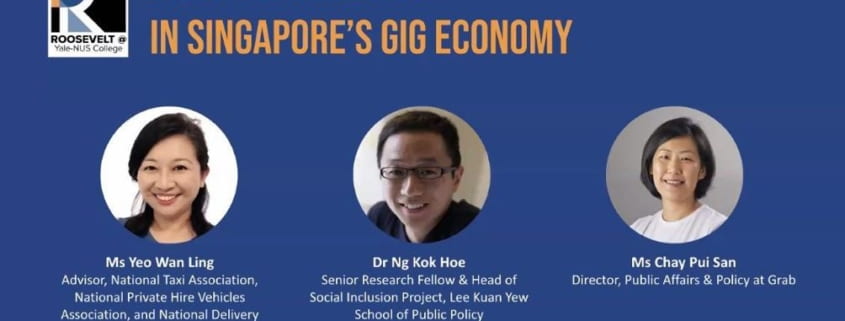Moderator’s Reflection: Social Protection in Singapore’s Gig Economy Webinar
Roosevelt@Yale-NUS hosted a panel discussion on the state of Social Protection in Singapore’s Gig Economy on August 30, 2021. We had the honor to invite 3 speakers who offered unique insights on the future of gig economy: Yeo Wan Ling (Director, U SME and U Women and Family at NTUC); Dr Ng Kok Hoe (Senior Research Fellow & Head of Social Inclusion Project at the Lee Kuan Yew School of Public Policy); and Ms Chay Pui San (Director, Public Affairs and Policy at Grab).
The following is a collection of the moderator’s key reflections of the panel discussion.
By Sean Low (’24).
Key Takeaways from the Gig Economy Panel Discussion
Most gig workers now are precariats, but large platforms do alleviate their predicament
- The precariat refers to a class of workers that suffer from a lack of income predictability and security.
- Modern gig workers are an example of precariats, though gig platforms have been able to leverage their mass to provide some income stability and social protection.
- However, more needs to be done to provide gig workers assurances over their livelihoods, while preserving the flexibilities in gig work they appreciate.
Providing a social safety net for gig workers is inherently complex
- The gig economy is incredibly diverse: workers come from different demographics and have varying challenges and purposes for joining the gig workforce.
- Furthermore, workers working for multiple platforms, insurance policy complexities, and the need to preserve economic sustainability for platforms that workers depend on adds even more complexity to the situation.
- Thus solutions are unlikely to be one-size-fits-all – they will need to be nuanced in order to preserve the flexibility that gig workers want and augment the social protection that they need.
Existing retirement planning regimes might be incompatible with the nature of gig livelihoods
- Existing retirement planning is configured for traditional employment and assumes income growth prospect.
- It is not clear whether the nature of gig work and income from it can fulfil these assumptions.
- Consequently, simply porting gig workers into social protection regimes designed for formal employees is likely counterproductive.
- We might have to develop more tailored safety nets for them, or have other stakeholders (e.g. unions, platforms, consumers) plug the shortfall more robustly.
Tripartite, industry partners and academia can continue to research innovative solutions and adapt them for Singapore
- Given the complexities of the solutions, a whole-of-society approach is likely needed to advance the gig economy safety net.
- Platforms can leverage their intricate gig worker data, and touchpoints to provide relief to gig workers, as they have done through the pandemic.
- Unions and academia can continue to research innovative safety net models and adapt them for Singapore.
- Consumers can (and should) treat gig workers with dignity and respect, and tip them for their services where possible.



Leave a Reply
Want to join the discussion?Feel free to contribute!